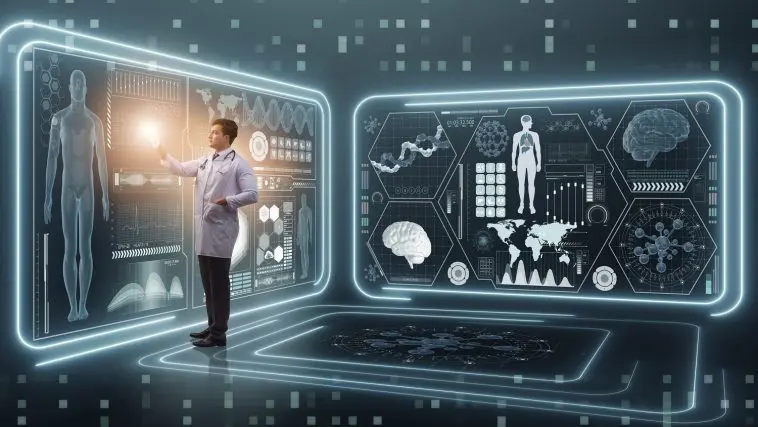[Originally published as the first part of Transhumanism]
Transhumanism is the attempt to artificially improve humans: to enhance their physical and/or mental abilities either by genetic modification, by incorporating technology, or a combination of the two. The World Economic Forum is vigorously pursuing transhumanism with the goal of creating a better society by actually modifying the individuals.¹ The idea is that genetically or technologically enhanced humans might have extraordinary athletic abilities, extremely high intelligence, resistance to disease, and lengthened lifespans.
Is such a goal possible? If so, is it something that we should pursue? What are the scientific and moral implications?
The Science and Fiction of Technological Augmentation
Science fiction books and movies often portray various forms of transhumanism in a generally positive light. The 1970s series, The Six Million Dollar Man, is one such example. Based on the book Cyborg, the series explores the fictional adventures of a man with “bionic” (artificial, technological) body parts that are superior in virtually every way to their biological originals.
Astronaut Steve Austin (played by Lee Majors) is badly injured in an accident, resulting in the loss of both legs, his right arm, and his left eye. These are all replaced with artificial (bionic) versions (for a cost of $6 million) that are far superior to the original. They enable Steve to run at speeds in excess of 60 miles per hour and jump 40 feet vertically.² Steve’s bionic right arm is able to lift a thousand pounds. And his bionic eye is able to zoom in at will as if using a telephoto lens.
The show’s title character is essentially transformed into a superhero thanks to technological augmentation. The show’s intro echoes the words of Oscar Goldman (played by Richard Anderson), who raised the funds for Steve’s bionic implants:
Gentlemen, we can rebuild him. We have the technology. We have the capability to make the world’s first bionic man. Steve Austin will be that man. Better than he was before. Better, stronger, faster.
Who wouldn’t want that? Many other television shows and movies explore the idea of replacing body parts with artificial parts that are far superior.³
At the moment, the idea of replacing biological body parts with superior technological ones is only found in science fiction. Current technology does allow us to replace some body parts with artificial versions, but these are never as good as the original. It is certainly a blessing that we now have the capacity to produce prosthetic limbs for people who have lost their originals through disease or injury. But I suspect every such person, if given the choice, would prefer to have the original biological version.
For example, some people use an insulin pump to control their diabetes. This piece of technology is essentially an artificial pancreas. In a healthy person, the pancreas secretes insulin — a chemical that helps blood sugar enter the cells. When the human pancreas doesn’t produce enough insulin, the result is high blood sugar — hyperglycemia or diabetes. Such conditions can lead to other serious problems.
An insulin pump can deliver insulin much like the pancreas. The pump is worn externally, and the insulin is delivered through a small tube with a needle that is inserted and taped to the skin. In most cases, the person needs to estimate the quantity of carbohydrates he is about to consume and set the pump to inject the appropriate amount of insulin.
It is wonderful indeed that we have such technology. But consider how superior a healthy pancreas is to the artificial version.
The pancreas God designed is entirely internal. It never needs new batteries. It never needs a refill of insulin because it produces its own. It does not need to be told how much insulin to produce because it automatically monitors blood sugar levels. And it requires no maintenance. The manmade version is certainly a blessing for those who need it but is not as good as God’s original design.
Such is the case with all artificial replacements. We should be grateful to God that we have the technology to replace defective or missing biological structures in our fallen world. However, the replacements are never as good as the factory originals.
But will this always be the case?
Will technological replacements eventually be superior to healthy biological versions? Will people begin to have perfectly healthy limbs and organs removed so that they can upgrade to superior artificial ones?
It is certainly possible to produce a machine that does one or more things better than a biological equivalent. We can make machines stronger than human muscle or cameras with greater resolution than the eye. But these devices are always inferior in many other ways.
A machine that is stronger than a muscle might also require far more space, be heavier, or require external power. The camera with greater resolution than the eye might not autofocus as fast or efficiently. And the eye has a far greater ability to accommodate ranges in brightness than any manmade camera to date.
Moreover, our biological systems require almost no maintenance and can even self-repair (to some extent) when damaged. They can even adapt depending on usage. For example, the more you use your muscles, the stronger they get. What manmade machine can do that?
So, the idea of replacing body parts with artificial versions that are superior in every way to the original may not be possible. The body is already amazingly well-designed. Might the notion that it isn’t well designed stem from an evolutionary view in which humans are merely a collection of mutations (mistakes) in the DNA that happened to improve the odds of survival?
Many evolutionists believe that the human body is a bad design since it supposedly has no intelligence behind it. In such a view, of course, anything we design should be better than what happens in nature by chance.
But in the biblical view, our bodies and minds have been deliberately designed by God — the same God who created the universe we inhabit. It may be that our bodies are as optimally designed as they can be to do what God made them to do. Any “improvement” to one area may involve many tradeoffs in other areas.
As a biblical creationist, I am skeptical that technology will ever allow replacements that are truly superior in all ways to the biology that God designed. However, I am grateful for those researchers who study ways to make artificial replacements as good as possible for the purpose of helping those who are injured or disabled in this fallen world.







